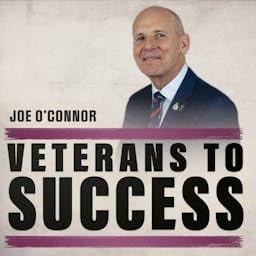Today marks a special day for Joe. In this episode, he discusses the significance of the date, October 30th, and its connection to themes of remembrance and transformation. He outlines his mission to inspire and educate one million entrepreneurs and veterans, alongside insights into his life chart, illustrating key milestones from his military service to his career as a financial advisor. KEY TAKEAWAYS The journey shared emphasizes that regardless of the obstacles faced - be it personal injuries, economic downturns, or life changes - maintaining a positive mindset and the right attitude can lead to success and recovery. Building a supportive network is crucial. Engaging with like-minded individuals through mastermind groups or business networks can provide motivation, accountability, and shared learning experiences. Joe outlines a series of steps to achieve success, including adopting a healthy lifestyle, managing time effectively, and setting realistic goals. A variety of strategies for relieving stress are discussed, such as practicing gratitude, taking regular breaks, and prioritizing sleep. BEST MOMENTS "Whatever happens, whether you go through a divorce, you get injured, something happens, then with the right mindset, the right attitude, you can come through it." "No problem is greater than the solution. And while I'm at it, what someone else thinks of you is none of your business." "Focus your energy on the things that you can control, and accept situations that are not changeable." VALUABLE RESOURCEShttps://www.joeteams.com/ - The unique membership site where you get access to a range of fantastic resources to help you strive, thrive and succeed in life, business and stature. https://JoeTeams.com/tbn - Transformer Business Network. A place where you can regularly meet up with like-minded entrepreneurs and veterans to share tips, increase your contacts and help each other grow https://www.joeteams.com/business-clarity-mastermind – Joining this programme provides you with a simple, unique and effective set of business resources which includes a monthly meeting with other business owners in a safe, secure and helpful environment which is designed to help you achieve your dreams, goals and aspirations. https://www.joeteams.com/TP - Because I became frustrated with all the ‘make this your best year yet’ stuff out there. I created the Pathfinder Ultimate Success Programme which really can change your life. If not, I offer a no quibbles 12 month money back guarantee. https://www.joeteams.com/book – My gift to you for tuning into the podcast is a FREE copy of my Pathfinder book. Enjoy! https://www.linkedin.com/in/itsjoeoconnor/ https://www.facebook.com/The1Transformer https://www.instagram.com/the1transformer/ HOST BIO Joe O'Connor is a resilient business entrepreneur and Financial Adviser dedicated to supporting business owners and veterans in their transition to civilian life. Despite facing life-threatening challenges at a young age, Joe defied the odds and embarked on a remarkable journey. From excelling as a Combat Engineer and Physical Training Instructor in the Royal Engineers to starting his own business as a Financial Adviser, Joe has displayed unwavering determination. After rejoining the Army as a reservist in the Bomb Disposal Unit, Joe reached the rank of Sergeant before transferring to the SAS, where he endured a severe injury and was medically discharged. Undeterred, he resumed his role as an IFA and founded a charity that aids injured veterans and their families. Joe's charity is currently finalizing plans for a training center and 23 Lodges, aiming to provide vital support for veterans transitioning to civilian life while addressing stress, anxiety, and PTSD. Today, Joe's mission is to unite business owners and veterans, helping them unleash their full potential for success.
続きを読む
一部表示
 1 時間 43 分
1 時間 43 分 57 分
57 分 57 分
57 分 2025/11/271 時間 23 分
2025/11/271 時間 23 分 1 時間 46 分
1 時間 46 分 49 分
49 分 1 時間 41 分
1 時間 41 分 1 時間
1 時間
